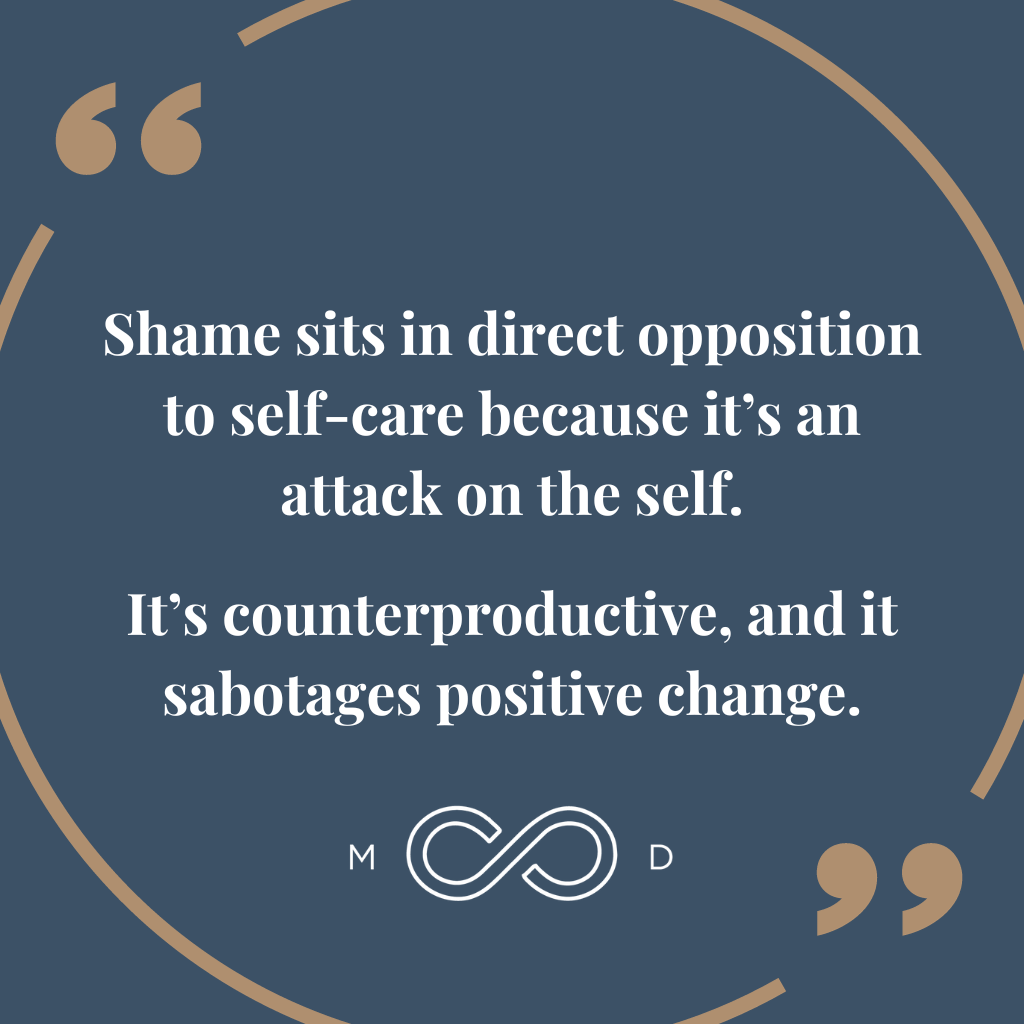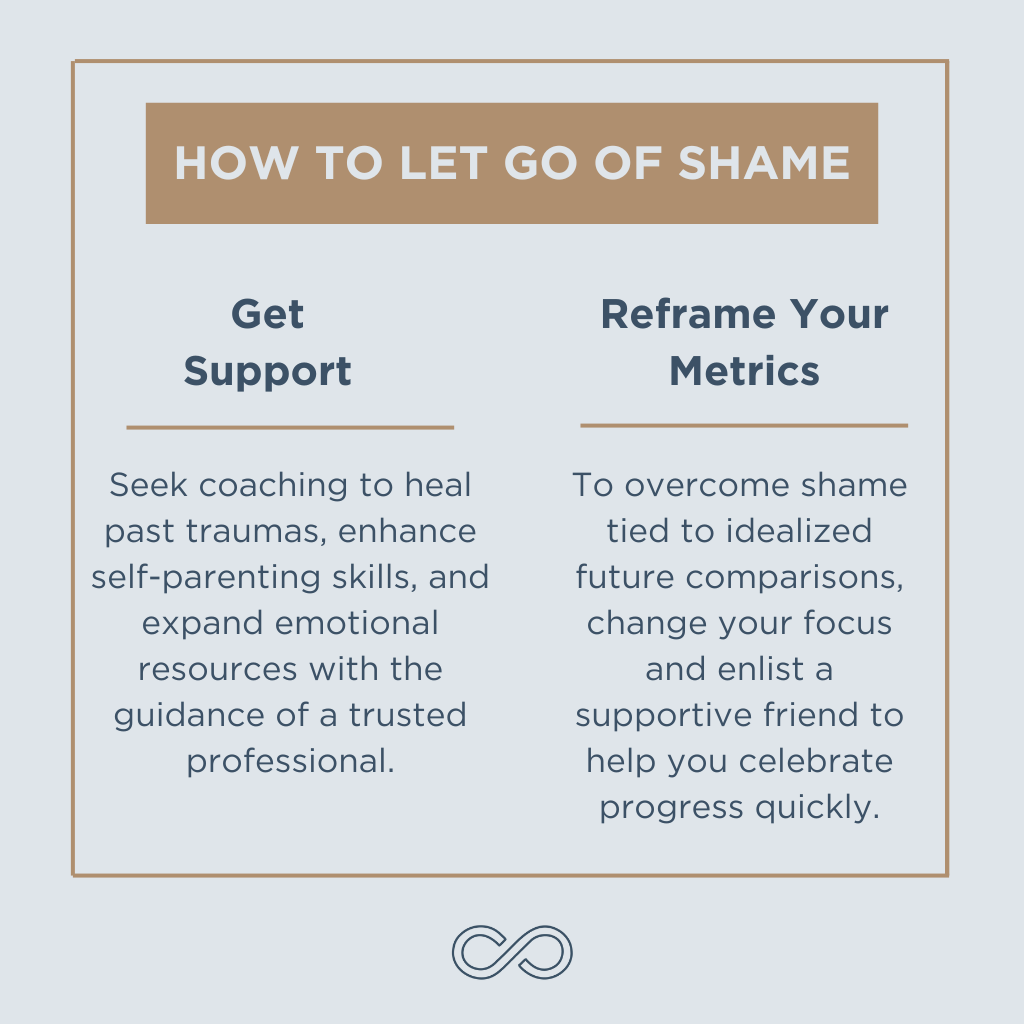High-achievers are used to, well, achieving. When they set a goal, they expect to conquer it.
So, when a high-achieving individual runs into difficulty meeting a health and wellness goal they’ve set for themselves, they’re confused. They’re successful in every other area of their life. Why not here?
While many explanations are possible, I want to highlight one critical yet oft-overlooked obstacle in the journey toward improved health: shame.
Shame can cause high-achieving people to struggle with making the self-care changes needed to reach their wellness goals.
To rectify the issue, let’s explore the difference between guilt and shame and how shame specifically detracts from self-care. After uncovering shame’s potential roots, we’ll discuss how to let go of shame and constructive steps to take to get there.
Distinguishing Guilt From Shame
One layer of complexity in the matter of letting go of shame is that shame can feel a lot like guilt. So, to begin, we need to distinguish between guilt and shame.
Guilt is a natural, healthy emotion that leads us toward reconciliation, whether with a family member, a friend, or ourselves. It’s resolved by apologizing, forgiving, and restoring relationships. Shame, however, never leads to reconciliation. Instead, it attacks our core selves. Left unaddressed, shame festers, becomes toxic, and can bleed into many areas of your life.
Specifically, shame sits in direct opposition to self-care because it’s an attack on the self. It’s counterproductive, and it sabotages positive change.
Shame can be tricky to identify, but by learning to recognize shame, distinguish it from guilt, and understand its roots, you can unlock a path toward healing and wellness.
 Uncover the Roots of Shame
Uncover the Roots of Shame
There seem to be two primary origins of shame for high-achievers who struggle with self-care despite general success:
1. Lack of Self-Parenting Foundation
I’ve discussed the idea of parenting oneself at length in the past. It means internalizing your parents’ healthy patterns of care for you and relying on those to navigate life’s issues as an adult.
These healthy patterns include four aspects:
- Encourage
- Rescue
- Comfort
- Gently correct and celebrate
Ideally, we’d all have nurturing upbringings with encouragement, emotional attunement, and gentle correction when needed. But not all our parents had the tools themselves to raise us this way.
Today, many intelligent, accomplished people lack one or more components of this self-parenting foundation. While this doesn’t stop you from becoming a high-achiever, it does become a weak link in your capacity to care for yourself. You can then develop some shame around your inability to carry out one of these critical pillars.
2. Measuring Progress Incorrectly
Another contributor to shame’s interference with self-care is not knowing how to measure progress and success. Many high-achievers who’ve already accomplished so much still struggle with the shame of not having reached yet another particular goal. They’re not happy or satisfied, and they don’t know why.
This difficulty almost always stems from another matter I often speak about, which is measuring not forward to the goal but backward to the beginning.
If you measure your progress against a future ideal, you’ll never be satisfied or encouraged until you reach that goal. The problem is that human beings need a sense of achievement and satisfaction to pick up momentum toward their goals. And high-achiever or not, you’re a human being.
If you always measure the gap between where you are now and where you want to be, discouragement will fight against your forward motion. The secret is to measure how much progress you’ve made from where you started.
This is a useful thought exercise if you discover you’re stuck in a pattern of beating yourself up for not achieving a goal. Sure, maybe you didn’t meet your weight loss target of 80 lbs., but you lost 56. Remember to look backward at the you that was 56 lbs. heavier. That’s not you anymore, and that’s a major accomplishment.
Whether in large matters or small, successful people who are also happy and satisfied measure backward from where they started.
 How to Let Go of Shame
How to Let Go of Shame
If you discover some shame masquerading as guilt or a lack of self-parenting, what should you do? How do you deal with and, ideally, let go of that shame?
Start with these positive steps:
Seek Support
If you notice shame related to a lack of self-parenting skills, I strongly recommend pursuing coaching. While some coaching can come through personal reading and self-education, getting another human — a life coach, business coach, counselor, or therapist — who can help you discover and heal past traumas can make an immense difference.
You can’t see your swing, so making corrections on your own often falls short. Finding a trusted, competent individual to identify hidden areas in need of healing or adjustment can expand your emotional resources.
Reframe Your Metrics
If your shame seems rooted in constantly measuring against an idealized future, the change is relatively quick. Change the direction in which you’re measuring.
The goal here isn’t to never get caught gazing at the ideal. The goal is to notice where you’re gazing more quickly so you can course correct, let go of that shame, and overcome dissatisfaction in a matter of hours and days, not months and years.
To assist, you might ask a friend, family member, or colleague you’re comfortable with to gently mention when they notice signs of discouragement and dissatisfaction. They can help you remember to look at how far you’ve come already and to celebrate incremental wins.
Conclusion
In a life filled with successes, elusive self-care goals can be perplexing. If you uncover some shame — clearly differentiating it from guilt — then delving into and addressing its origin can help you break free from that negative, toxic experience and heal. It can be emotional work, but it’s worth doing.
As patients practice this, they learn to manage, weaken, and even let go of their shame. And as they move forward with healed perspectives, I see other developments regularly crop up. Weight loss shows up. Blood pressure comes down. Morning exercise gets consistent. Suddenly, the goals that eluded the high-achiever are more attainable.

Dr. Aaron Wenzel is a concierge physician specializing in the care of fast-moving entrepreneurs, executives, and public figures in the Nashville, TN area. Dr. Wenzel’s diverse life experience and extensive training in family medicine, emergency care, nutrition, and hormone replacement therapies give him the unique platform to provide unmatched care for his patients.







